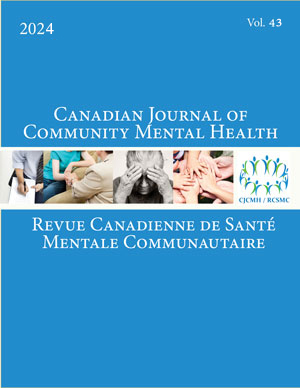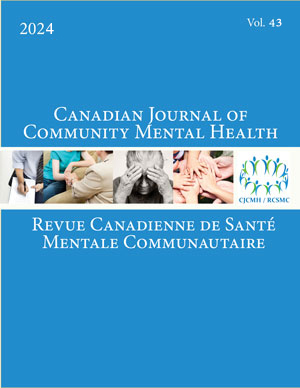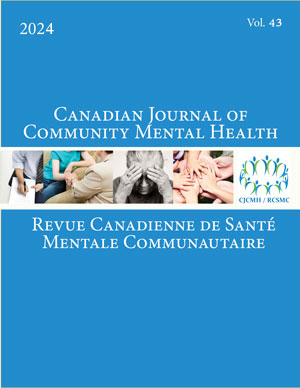Volume 43 • Number 1 • March 2024
Articles
Partnering with patients and family caregivers (commonly referred to as patient partnership) is increasingly common in health services, research, education, and policy. In the field of mental health, service user involvement intersects with distinct historical trajectories and as such, may take on unique forms. This review draws on a broader systematic review of literature on patient partnership. We ask: How does literature on patient partnership in mental health and addictions describe the history of service user involvement and the roles of service users? Two broad frames for service user involvement are identified, which offer contrasting perspectives about the history, value, and power relations involved in service user involvement. Future research can consider implications of these perspectives, and opportunities for synthesis.
The idea of community in community mental health has recently been criticized as problematic in that it has been ill defined, under-investigated and under-theorized. In this article we introduce actor-network theory as a useful framework for the analysis of everyday psychiatric and legal interventions and their effects. We focus on the community treatment order (CTO) in Alberta as one such intervention, showing how community positions people diagnosed with mental illness as risky subjects. In examining the CTO as an important actor in the construction of mental illness, we argue that the idea of community acts as a counterweight to balance rights, a carrot in a mechanism of consent, and as a crucible where interpretive work on a subject must be done in chains of examinations. Further, we propose a procedural and relational definition of community to inform scholarly work as well as professional practice.
People with borderline personality disorder (BPD) are typically excluded from assertive community treatment (ACT) teams, the intensive model that typically serves people with serious psychotic and mood disorders. Nevertheless, many people with BPD are on ACT teams for clinical comorbidity or other reasons. Suitability and ability of ACT to provide their care is understudied. Our scoping literature review shows a limited body of research, with strong but mixed opinions on this dilemma, but notable incorporation of training and skills (e.g., dialectical behavioral therapy) into ACT may improve care for this population whose presence on ACT teams is a clinical reality.
This rapid review investigated the mental health concerns of sexual orientation and gender identity expression (SOGIE) refugees in Canada. Database searches yielded 365 results across five databases, providing 12 papers for final thematic analysis once inclusion criteria were applied. Three themes emerged: (1) Stigma and discrimination negatively affected mental health and well-being; (2) SOGIE refugees faced challenges accessing services; and (3) the refugee claims process adversely affected well-being. Recommendations to improve SOGIE refugee well-being include implementing culturally safe policies in agencies, life-skills programs, and supportive spaces; promoting inclusivity, interprofessional collaboration between services, and innovative agency outreach to refugees; addressing biases in refugee claims boards and extending the refugee claim eligibility period.
Practice Innovations
Cet article présente le modèle des Men’s Shed, ou ateliers pour hommes, comme pratique innovante en santé mentale communautaire. Il détaille les problématiques auxquelles ils répondent, leur fonctionnement et les défis. Nous soulignons le besoin de littérature scientifique en français sur la question.
This article describes a novel framework for the provision of individual psychotherapy for youth with histories of homelessness. We discuss the value of a one-at-a-time therapy approach in stepped care contexts through the Housing Outreach Project—Collaborative (HOPC), a comprehensive program for young people transitioning out of homelessness in Toronto, Canada.
Canadian Muslims are a growing population at an increased risk of addiction who have been found to underutilize health services. The Canadian-Muslim Addiction Program (C-MAP) offers an innovative intervention serving as a practice for public-health education to transform addiction care in this population by reducing stigma and increasing help-seeking.
To support population mental health, mental hygiene propounds a universal public recommendation. March 2022 was the inaugural mental hygiene challenge where community members were invited to spend 10 minutes a day throughout the month engaged in mental hygiene activities. The outcomes suggest daily mental hygiene supports mental well-being.









